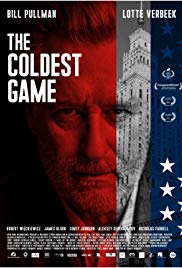
THE COLDEST GAME
Poland, 2019, 96 minutes, Colour.
Bill Pullman, Lotte Verbeek, James Bloor, Robert Wieckeiwicz, Corey Johnson, Nicholas Farrell.
Directed by Lukasz Kosmicki.
After watching this film, the immediate action is to go to Wikipedia to see whether it is based on fact. The director has said that it is not, the commentators say he was remembering chess matches, Bobby Fischer versus Russians.
In fact, one commentator said that this was a fusion of fact and fiction. The facts concerning the 13 days in October 1962 (the subject of a strong film 13 Days with Kevin Costner), the period of the missiles of October, those steaming towards Cuba on the instructions of Nikita Khrushchev, the strategies employed by John F. Kennedy and the averting of nuclear war.
This is a film about espionage, trying to get information about the ships carrying the missiles, the recruiting of a former chess player, now an alcoholic professor, Joshua Lansky (an effective performance by Bill Pullman), to go to Warsaw to be in competition with the Russian, the Russians wanting some prestige. The Professor is reluctant, is drugged and abducted by the Americans, sent to Warsaw, where he continues to drink, experiences some drug and hypnotic experiences, forfeits matches, wins some, does not remember others distinctly.
This is a Polish film and shows Russian activity and espionage in Warsaw. There is a twist asking whether the American recruiter, Agent Scott (Lotte Verbeek) is authentic or a counterspy. There are some friendly Poles who helped the Professor, especially with alcohol, there is an urgent American agent who reveals some information but is poisoned.
The professor finds himself caught up in the espionage, challenged as how to he will act, making contact with the agent who will supply him with the information but there are experiences with double agents and a surprising intervention from a military man who saves the professor. Information is transmitted to Washington. President Kennedy makes a speech. The ships with the missiles turn back.
Not a major film but quite intriguing in its way.
1. History? Speculation? Intrigue?
2. October 1962, the Cold War, tension between the US and USSR, the Cuban missiles? The intentions of Kruschev? The response of Kennedy? Tension, nuclear war?
3. The American settings, Brooklyn, the card game, the professor? The Warsaw settings? The city, the buildings, interiors, the chess game? The American Embassy? The sealed room? Basements, rulings? The musical score?
4. The title, the cold war? The chess competition? Russian prestige? The setting up of the match? The death of the protagonist, poisoned? The use of the professor as substitute? His being used by the diplomats? To get information about the missiles and pass it on?
5. The opening, the game, the flashbacks, the succeeding days, intercut with the tensions about the missiles, the shipping, the plans, the diplomacy?
6. The professor, his character, the past, successor chests? Playing cards, his being set up for scamming money? Agent Scott and her intervention, his refusal, his being taken, drugged, taken to Poland? His mission? His reaction?
7. Agent Scott, in herself, her work, connections, guarding the professor? At the matches, the conversations? The setup, her coming into the toilets, the agent, the agent and her being killed? The military official? The two corks? The question of her being a double agent?
8. The staff of the embassy, the tension? Receiving the professor? The negotiations? Agent White? Young, connections, information, his cover? Warning the professor? His being poisoned?
9. The Polish celebrations, song and dance in the auditorium, the stage, the chess matches, the results, the reactions of the audience?
10. The professor, alcoholic, forfeiting the first game, his mind’s eye and the moods? Drinking, forgetting what happened? The further games, his adversary, wary, the moves, the success of days? Going missing? The socials, the Polish diplomats?
11. The professor, the Polish Communist, his friendliness, getting the alcohol, slipping out of the building, the red card, warding off the police? The professor later having the red card and giving it to the Polish officer and his escape?
12. The buildup of tension, the missiles, Kennedy, the professor and the cork, in the soundproof room, the discussions about which was the genuine message? Transmitting to the US? Kennedy’s broadcast?
13. The Russians and the reaction? The interrogation of the friendly official, the alcohol?
14. The professor, dressed in the uniform, the diplomatic protection against the military and guns? The return to the US? The officer and their meeting? His not wanting to be
looked after?
15. The film and its warning against nuclear confrontation and the final quotation from President Reagan?